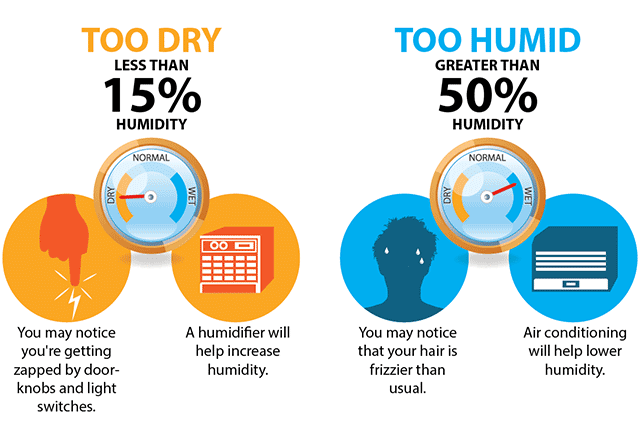HOW DO I CONTROL THE HUMIDITY IN MY NORTH CAROLINA HOME?
Nov 26, 2018
Controlling the Humidity in Your NC Home
Here in North Carolina, humidity plays a major role in the air quality of your home. To understand the optimal humidity for a home, you first have to know what humidity actually is. Humidity is the amount of water vapor in the air, and it can vary with the seasons and the weather. Humidity is measured as a percentage. If the air contains as much water vapor as it possibly can, it has 100% humidity, like a steam room. If you have dry air in your house, you’ve got very low humidity. This is like a sauna, which only has about 5% or 10% humidity.
What Humidity Should My House Be?
So what is the most comfortable humidity level? And how do you know what the current humidity level is in your home? The EPA suggests that humidity should be between 30% and 50% to prevent mold growth. A hygrometer is the most accurate way to measure the humidity in your home, but there are other signs you can look for as well.

How to Control Low Humidity in Your Home
If you have low humidity in your home, the air will feel dry. You might have a sore throat and cracked skin or lips. Low humidity is one of the most common causes of nosebleeds since the mucous membranes dry out a bit more with each breath. Low humidity is especially a problem during the autumn, winter, and early spring. Have you noticed a lot of static electricity in your home lately? If you’ve been getting zapped by doorknobs and light switches, you may have low humidity.
There are several ways to fix low humidity in your home. If it’s warm and humid outdoors, open your windows to let that warmer air inside. You can also place containers of water around your home. The water will evaporate and add moisture to the air. If you’re feeling the effects of low humidity, you can quickly increase the humidity in the kitchen by boiling a pot of water.
For a more noticeable increase, consider purchasing a central humidifier. This type of humidifier is built into your HVAC system and will keep the whole house at the optimum humidity. You can also use single-room humidifiers, but these require a bit more maintenance. They must be cleaned every three days to prevent mold growth and mineral deposits, and filters and water must be changed regularly. A humidifier that’s blowing out dirty air can be even worse for your health than low humidity. Ask your service technician about adding a central humidifier to your HVAC system, which requires less maintenance and is more efficient at heating your entire home rather than a single room.
How to Control High Humidity in Your Home
If you have high humidity in your home, the air can feel hot, sticky, steamy, or muggy. High indoor humidity levels most frequently pose a problem during the summer (think North Carolina in August). All that excess moisture in the air seeps into anything that’s dry, including your carpet, pillows, mattresses, bedding, and clothing. Mold, mildew, dust mites, and harmful bacteria thrive in these wet, warm environments, leading to health concerns as well as possible damage to your home.
You can fix high humidity levels in your home by controlling the moisture in the air. Ventilate areas where moisture levels are high; the bathroom, kitchen, and laundry room are most likely to suffer from high humidity. Make sure that your dryer vents to the outside, and use exhaust fans to allow moist air to escape. You can also reduce the moisture in your air by buying certain indoor plants, which will beautify your home as well as the air inside it.
An air conditioner can remove the excess water from the air to decrease humidity in your home. Your air conditioner drain pan is actually full of water that’s been sucked out of the air. If turning on the air conditioner doesn’t help, you may want to purchase a dehumidifier. Like humidifiers, you can find portable dehumidifiers that will decrease humidity in one room. This type of humidifier is helpful if, for example, your basement floods. If humidity is a major issue in your home, you may want to consider purchasing a central dehumidifier. This type of unit will condition the air to ensure optimal humidity levels throughout your home.
When to Call Local HVAC Repair
Very high or low humidity can be uncomfortable for you and can even damage your home. If the air in your North Carolina home feels too dry or too moist, contact a professional service technician at Newcomb & Company. We’ll send someone out to check the humidity levels in your home and offer recommendations so you can breathe easy.
Need help? Call now.